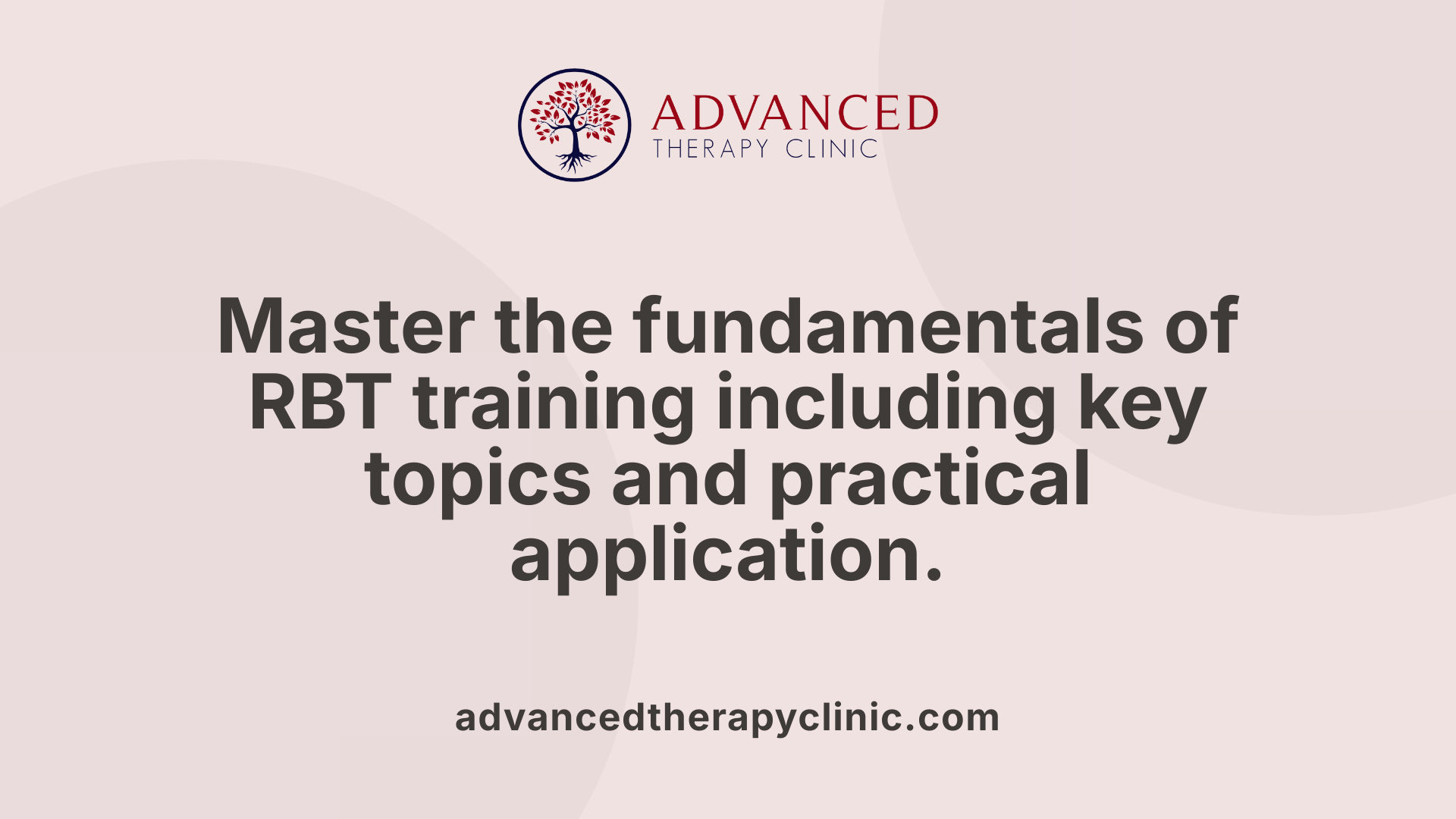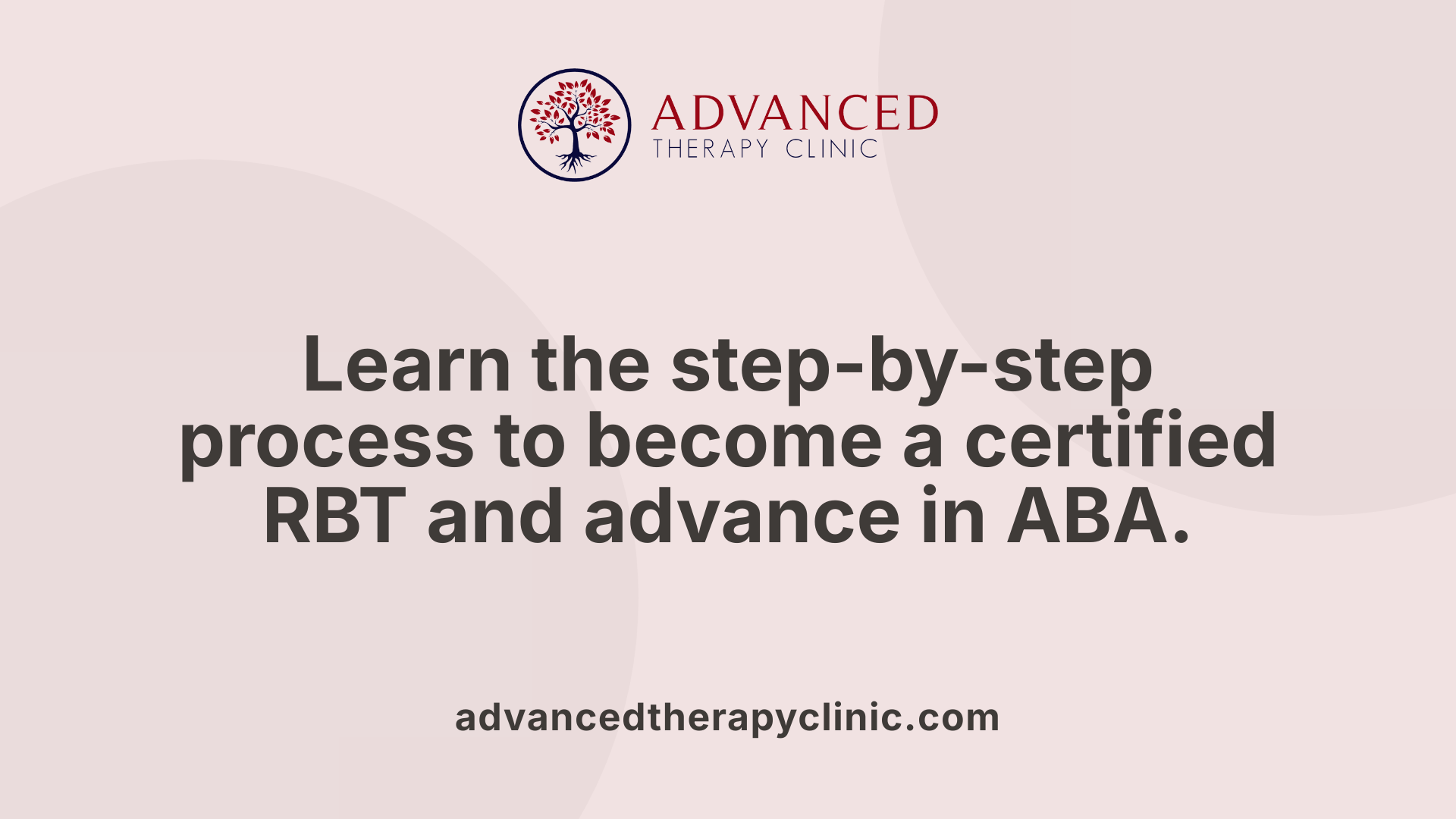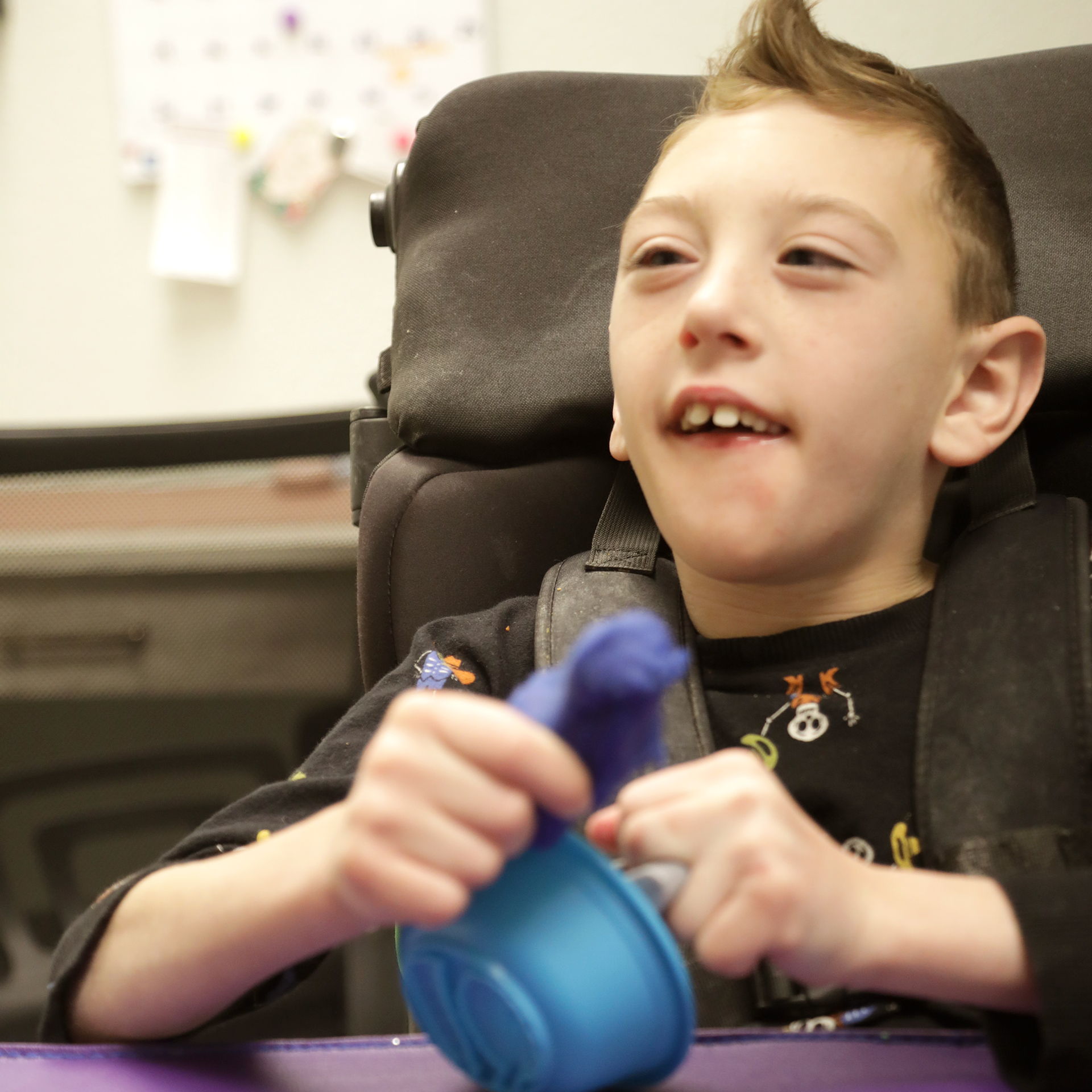Find Free RBT Training Near You


Begin Your Path as a Registered Behavior Technician Today
Are you interested in pursuing a career in applied behavior analysis (ABA) and seeking accessible ways to start? Finding free RBT training programs can be a great first step. This guide explores what RBT training involves, where to find free options, certification requirements, program comparisons, and potential career pathways to help you make informed decisions on your professional journey.
Understanding the Core of RBT Training

Overview of RBT training
Registered Behavior Technician (RBT) training is a comprehensive program designed to prepare individuals for a career in behavior analysis. The training is delivered entirely online, providing flexibility for learners to complete the coursework at their own pace. The course emphasizes practical, evidence-based strategies used in applied behavior analysis (ABA), which are essential for effective practice.
Duration and format of training
The program offers a 40-hour online course that must be completed within 180 days. It is structured to be accessible and flexible, allowing students to learn according to their schedules. The training includes self-paced modules, videos, and assessments, making it suitable for a wide range of learners.
Key topics covered in training
Core subjects in the course include behavior observation, data collection methods, ABA intervention strategies, and ethical considerations. Students also learn about behavior reduction, skill acquisition, measurement techniques, and the importance of professional ethics in practice. The course involves instruction from experienced behavior analysts, such as BCBAs and BCBA-Ds, ensuring high-quality content aligned with BACB standards.
What does RBT training involve?
RBT training involves completing a minimum of 40 hours of coursework based on the RBT Task List (2nd edition). It must be finished within 180 days and over at least five days. The training covers fundamental topics like ABA principles, data collection, behavior management, and ethics, delivered by qualified instructors. Participants receive documentation such as a certificate of completion, trainer signatures, and content descriptions. After coursework, candidates undergo supervised assessment and must pass the BACB exam to earn certification.
This rigorous training process supports students throughout their certification journey and enhances their practical skills, opening pathways for career growth in behavior analysis.
Locating Free RBT Training Programs Near You

Where can I find free RBT training programs?
Finding no-cost options to meet the Registered Behavior Technician (RBT) training requirements is possible through several reputable sources. One prominent platform is the Autism Partnership Foundation, which offers a free, comprehensive 40-hour online RBT training course. This program includes essential training materials, practice exams, engaging activities, and a certificate of completion. Designed to align with BACB standards, it aims to make quality training accessible to those working to support individuals with autism.
Besides the Autism Partnership Foundation, other organizations like Jigsaw Connects promote free RBT training options. While some providers offer free courses, others such as CentralReach and Relias provide paid programs with extensive resources. It's crucial to verify that any free training program complies with BACB guidelines to ensure it qualifies for RBT certification.
To find the latest free RBT training opportunities, exploring online comparison websites can be helpful. These platforms review and list programs based on their curriculum quality, pass rates, and cost. By doing so, aspiring RBTs can make informed decisions on where to undertake their training, ensuring it is both affordable and meets certification standards.
Certification Pathway and Requirements

What are the certification requirements and process for RBTs?
Becoming a Registered Behavior Technician (RBT) involves several clear steps and eligibility criteria. First, applicants need to meet fundamental requirements such as being at least 18 years old and holding a high school diploma or its equivalent. They must also pass criminal background checks and abuse registry checks to ensure suitability for working with vulnerable populations.
A core step in the process is completing a 40-hour training program aligned with the RBT Task List. This training covers essential topics like behavior observation, data collection, ABA strategy implementation, and ethics, which are all crucial for effective practice.
After the training, candidates must demonstrate their competency through an Initial Competency Assessment, conducted by a qualified BACB certificant. This assessment ensures they are ready to apply their knowledge safely and effectively.
The application itself is completed online via the BACB website, where applicants submit necessary documentation and create an account. Upon approval, they can schedule and take the RBT exam.
The exam consists of 85 multiple-choice questions that test understanding of core concepts, including supervision, assessment, measurement, and ethics.
Passing the exam grants RBT certification, allowing professionals to work under supervision in various settings.
To maintain their credentials, RBTs are required to participate in ongoing supervision, complete renewal assessments yearly, and adhere to the BACB's ethical standards.
This structured pathway ensures RBTs are well-prepared and ethically grounded in their role, supporting a high standard of care and professional growth.
Evaluating Different RBT Training Programs

How do different RBT training programs compare in terms of content and resources?
RBT training programs vary widely in their curriculum, support systems, and overall value. The 40-hour online courses designed to prepare students for the BACB RBT exam generally include essential topics such as behavior observation, data collection, ABA strategies, and ethical considerations. Some programs focus on comprehensive, evidence-based content developed by experienced behavior analysts, ensuring learners cover practical skills and standards
Premium programs often incorporate additional resources like practice exams, study guides, and interactive elements such as discussion groups and instructor feedback. For example, courses offered by platforms like CentralReach or Rethink include these extras and sometimes provide real-world case studies and competency assessments.
Lower-cost or free options, such as those from the Autism Partnership Foundation, might offer foundational knowledge but often lack extensive support or practice tools. Consequently, students looking for more robust preparation may prefer programs that allocate resources for mentorship, testing aid, and live supervision.
What additional resources and support are available?
Top-tier programs commonly feature mentorship from certified behavior analysts (BCBAs), which grants learners insights and direct guidance through their certification journey. These mentorships are valuable for gaining practical knowledge and understanding professional ethics.
Online courses typically provide study guides and practice tests tailored to the BACB RBT exam. Some platforms also include continuing education units (CEUs) and ongoing professional development options.
In addition, most programs are fully online, self-paced, and designed to fit individual schedules, making it easier for learners to balance their education with personal commitments.
How does cost compare to benefits?
While some programs cost more upfront, they often offer superior resources, higher pass rates, and better preparation for real-world work. Conversely, lower-cost options or free courses may be suitable for learners with limited budgets but might lack comprehensive support or exam readiness features.
Investing in a program with extensive resources and mentorship can increase the likelihood of passing the exam on the first try and ease the transition into supervised practice.
| Training Program | Cost Range | Additional Resources | Support Features | Suitable For |
|---|---|---|---|---|
| Basic Online Courses | Low to Moderate | Study guides, practice tests | Limited mentorship | Budget-conscious learners |
| Premium Courses | Higher | Practice exams, instructor access, mentorship | Extensive mentor support and real-life case studies | Learners seeking thorough preparation |
| Free Programs | Usually free | Minimal | Usually none | Learners exploring the field or with limited resources |
Choosing the right program depends on individual goals, available resources, and preferred learning style. Considering the curriculum content, support offerings, and costs can help prospective RBTs select the best fit for their career starts.
Career Opportunities for RBTs and Beyond
What are the career pathways available for Registered Behavior Technicians?
Registered Behavior Technicians (RBTs) have a variety of career options within the field of Applied Behavior Analysis (ABA). Starting usually with hands-on experience gained through supervised practice, RBTs often continue their education to unlock more advanced roles.
A common next step is to pursue additional certifications such as becoming a Board Certified Behavior Analyst (BCBA) or Board Certified Behavior Analyst-Doctoral (BCBA-D). These certifications require completing specific coursework, acquiring supervised fieldwork hours, and passing a comprehensive exam.
With experience, RBTs can take on responsibilities like developing intervention plans, conducting assessments, or supervising other therapists. This progression allows for greater influence on client outcomes and professional growth.
Beyond technical roles, RBTs may also assume leadership positions in organizations focused on ABA services. Specializations such as autism education or healthcare-related roles are also avenues for advancement.
As demand for ABA services continues to grow, RBTs who pursue ongoing education and skill development can find lucrative and meaningful careers. The field offers pathways from direct support roles to leadership, research, or specialized practice, supporting long-term career Fulfillment.
What roles do RBTs fulfill in the field of ABA?
RBTs primarily assist in implementing behavior intervention plans, collecting data, and supporting clients directly under supervision. They play a vital role in the hands-on delivery of ABA strategies, often working with individuals with autism spectrum disorder and other developmental conditions.
Their responsibilities include behavior observation, data collection, supporting skill development, and maintaining ethical standards as outlined by the BACB. RBTs serve as the operational backbone of ABA services, ensuring that treatment plans are followed accurately.
Are there additional certifications and specializations available?
Yes, beyond the RBT credential, professionals can pursue specialized training in areas such as autism spectrum disorders, early childhood intervention, or organizational behavior management. These specializations often require additional coursework and practical experience.
Many RBTs continue earning Continuing Education Units (CEUs) to stay current with evidence-based practices and maintain certification status. This ongoing professional development opens doors to niche roles and leadership positions.
| Certification Level | Focus Area | Requirements | Career Impact |
|---|---|---|---|
| RBT | Implementation of ABA | 40-hour training, supervised experience, exam | Entry-level practitioner |
| BCBA | Designing Interventions | Master's degree, coursework, supervised hours, exam | Supervisor, program developer |
| BCBA-D | Advanced Practice | Doctoral degree, coursework, supervised hours, exam | Researcher, senior consultant |
Mentorship and Supervision in RBT Training
How does supervision support RBT training?
Supervision plays a crucial role in preparing Registered Behavior Technicians (RBTs) for their professional responsibilities. It involves Board Certified Behavior Analysts (BCBAs) providing ongoing guidance, assessment, and support during the training process.
Through supervision, RBTs receive direct feedback on their implementation of ABA strategies and data collection techniques. Supervisors demonstrate proper procedures and intervene when mistakes occur, fostering a supportive environment for skill development.
Supervision also ensures that RBTs adhere to ethical practices and maintain high standards of client care. Regular case discussions and modeling by BCBAs help build confidence and refine practical skills.
Additionally, supervision facilitates professional growth by offering mentorship, addressing concerns, and guiding RBTs through complex cases. This oversight not only prepares them for certification exams but also equips them with the competence needed for successful, ethical practice in real-world settings.
Role of BCBAs in mentorship
Behavior Analysts serving as supervisors or mentors play an integral part in RBT development. They bring extensive expertise to the training, offering practical insights derived from years of experience.
Mentors provide personalized feedback, encourage reflection on practice, and share strategies for overcoming challenges. They act as role models, demonstrating best practices aligned with ABA principles.
This mentorship often includes supervised hands-on experiences that prepare RBTs for the demands of the job. The guidance from seasoned BCBAs enhances confidence, ensures fidelity to intervention plans, and prepares RBTs for the BACB certification process.
Supervised practical experiences
In addition to classroom or online coursework, supervised practical experiences are a core component of RBT training. Under the supervision of BCBAs, students gain real-world experience implementing ABA interventions.
These practical hours involve observing clients, collecting and analyzing data, and applying strategies as instructed. The supervision ensures that RBTs accurately apply behavioral techniques and reinforce their learning in a controlled, supportive environment.
Such experiences are essential for meeting BACB requirements, as they demonstrate the RBT’s ability to perform competently in diverse situations. They also contribute to the ongoing professional development necessary for effective and ethical behavior analytic practice.
| Aspect | Description | Additional Details |
|---|---|---|
| Supervision Role | Provides guidance, feedback, and oversight | Ensures skill competence and ethical compliance |
| Mentorship | Shares expertise, models best practices | Fosters professional growth and confidence |
| Practical Experience | Hands-on implementation under supervision | Prepares RBTs for certification and real-world tasks |
This comprehensive approach, combining mentorship, supervision, and practical experience, supports RBTs in becoming skilled, ethical professionals capable of delivering effective behavioral services.
Technology and Resources Supporting RBT Training
Numerous resources are available to support RBT training, particularly through online, self-paced platforms designed to accommodate busy schedules. These programs include a variety of interactive tools such as quizzes, practice tests, and detailed study guides that reinforce learning and help prepare candidates for the BACB RBT exam.
Many training providers develop multimedia content that includes videos, case studies, and animations to illustrate core ABA concepts like behavior observation, data collection, and ethics. These materials make complex topics more approachable and easier to understand.
Mentorship features and discussion forums are often integrated into these courses, enabling students to engage with experienced BCBAs and other learners. Virtual live sessions and Q&A opportunities further support active learning and real-time clarification.
Additional resources such as sample data collection sheets, policy documents, and video demonstrations of ABA strategies provide practical insights and hands-on experience, preparing students for real-world application.
Overall, these modern technological tools and supplementary materials significantly enhance the RBT training experience, making it accessible, engaging, and thorough for learners aiming to achieve certification.
Role of ABA Professionals in Training and Certification
Involvement of BCBAs and BCBA-Ds
Behavior analysts, including Board Certified Behavior Analysts (BCBAs) and BCBA Doctorates (BCBA-Ds), play a crucial role in designing and delivering RBT training programs. Their expertise ensures the curriculum is rooted in evidence-based practices, covering essential areas like ethics, behavior assessment, data collection, and the implementation of ABA strategies. These professionals not only create content but often serve as instructors or mentors, providing practical insights and oversight throughout the training process.
Curriculum Development
The development of RBT training programs involves careful planning by seasoned behavior analysts. They compile curricula that align with the BACB Task List (2nd edition), ensuring comprehensive coverage of core topics needed for competence as an RBT. The curriculum typically includes modules on behavior observation, data collection, behavior reduction, teaching new skills, and professional ethics. These programs sometimes incorporate multimedia resources, interactive assessments, and practice tests to enhance learning and retention.
Ensuring Quality and Standards
Maintaining high standards in RBT training is paramount. Professionals involved adhere to BACB guidelines, ensuring that content is up-to-date and compliant with certification requirements. Quality assurance measures include peer review, regular curriculum updates based on current research, and rigorous evaluation of training outcomes.
Many programs are rated highly by the BACB for their pass rates, which reflects their quality and efficacy. The involvement of licensed behavior analysts guarantees that students receive accurate, relevant, and ethically sound training. Additionally, ongoing professional development opportunities, such as CEUs, and mentorship from experienced BCBAs contribute further to maintaining excellence in training standards.
| Contributor Type | Role | Contribution | Quality Assurance Measures |
|---|---|---|---|
| BCBAs and BCBA-Ds | Curriculum development, instruction | Designing evidence-based, comprehensive training modules | Peer review, adherence to BACB standards, updates |
| Instructors | Delivery of course content | Providing practical guidance, mentorship | Student feedback, certification pass rates |
| Program Developers | Program design and quality control | Incorporating current research and best practices | Continuous review, alignment with BACB requirements |
| Certification Bodies | Oversight and accreditation | Setting standards, licensing requirements | Monitoring program compliance, evaluations |
This systematic approach involving experienced professionals and strict adherence to standards ensures that RBT training programs remain credible, effective, and aligned with professional certifications in behavior analysis.
Continuing Education and Professional Growth for RBTs
What resources are available for continuing professional development?
Registered Behavior Technicians (RBTs) have access to a wide variety of educational resources to support ongoing professional growth. Recognized providers offer hundreds of Continuing Education Units (CEUs) through courses, webinars, workshops, and conferences. These opportunities enable RBTs to stay current with the latest developments in Applied Behavior Analysis (ABA) and refine their skills.
Meeting BACB renewal requirements often involves ongoing supervision and assessment, making continued education a crucial part of maintaining certification. In addition to meeting certification standards, advanced coursework can open doors to specialization.
Some popular areas for specialization include autism behavior management, social skills training, and organizational behavior management. Many programs provide online modules that are flexible and accessible, ideal for busy professionals. Practical training sessions and mentorship programs further support RBTs in acquiring practical experience and deepening their expertise.
Engaging in these educational activities not only helps RBTs fulfill certification renewal requirements but also enhances their career advancement potential, allowing them to develop niche skills and improve client outcomes.
Assessing Training Effectiveness and Success Rates
How can the effectiveness of RBT training programs be evaluated?
The success of RBT training programs is often measured through several indicators. One primary metric is the pass rate on the BACB RBT exam; high pass rates suggest that the training effectively prepares students for certification. Trainee feedback forms are also valuable, as they shed light on how well the course content, materials, and delivery meet learners’ needs.
Surveys conducted post-training can evaluate the clarity of instruction, accessibility of online resources, and overall learner satisfaction. Additionally, tracking the employment and performance of new RBTs in the field provides insights into how well the training translates into practical skills.
Organizations committed to continuous improvement regularly review these metrics. Updating course content based on feedback and current evidence ensures that training remains relevant and effective. Supplementary support such as practice tests, mentorship from experienced BCBAs, and ongoing professional development opportunities also contribute to higher success rates.
Pass rates and certification outcomes
The offered 40-hour online RBT course is reported to be aligned with BACB standards. The program’s high pass rates affirm its quality, suggesting that students complete the course equipped with the necessary knowledge for the exam.
Passing the BACB RBT exam is the final step for certification, which then allows individuals to work under supervision in applied settings. This pathway is essential for career development in behavior analysis and related fields.
Feedback and quality improvement
Feedback collected from past students helps the program refine its curriculum and delivery methods. It encourages a learner-centric approach that emphasizes clarity, relevance, and accessibility.
Furthermore, the program’s inclusion of evidence-based content, supervision, and mentorship ensures participants are supported throughout their certification journey. This comprehensive approach fosters success and enhances the overall reputation of the training provider.
| Evaluation Metric | Typical Use | Impact on Program Improvement |
|---|---|---|
| Pass rates | Prepare students for exams | Identify curriculum strengths and gaps |
| Trainee feedback | Improve course content and delivery | Maintain high student satisfaction |
| Job performance post-certification | Assess practical readiness | Ensure training translates into effective practice |
| Continuous review | Update training based on latest research | Keep program credible and effective |
Practical Tips for Successful RBT Certification
Effective study strategies
Creating a focused study plan is essential. Break down the 40-hour training content into manageable sections, and set regular goals to review core topics like behavior observation, data collection, ABA strategies, and ethics. Practice with sample questions and assessments provided by the program to identify weak areas and strengthen understanding. Engaging with practice exams not only tests your knowledge but also boosts confidence.
Time management tips
Balancing the training with other responsibilities requires good planning. Schedule consistent study times, breaking sessions into shorter periods to maintain focus and prevent burnout. Using a calendar or planner helps track progress and deadlines for exam registration and supervised experience.
Utilizing available resources
Take full advantage of the resources offered, such as study guides, practice tests, and online quizzes. These are designed to prepare you for the format and types of questions on the exam. Join online study groups or forums to connect with peers, share insights, and stay motivated. Regular review of ethics, supervision, and assessment content keeps your knowledge current and comprehensive.
By combining effective study techniques, disciplined time management, and resourcefulness, aspiring RBTs increase their chances of success on the exam and within their professional roles.
Future Outlook and Demand for RBTs

What is the future outlook for RBTs and ABA professionals?
The job prospects for Registered Behavior Technicians (RBTs) and other ABA professionals are on the rise. Increased recognition of autism spectrum disorder and the proven effectiveness of Applied Behavior Analysis (ABA) therapies are fueling a growing demand for qualified practitioners.
As insurance coverage and public funding for ABA services expand, more families are able to access these beneficial therapies. This trend ensures a steady increase in employment opportunities across various settings such as clinics, schools, and community programs.
The ABA field also offers diverse career paths. RBTs can advance by gaining experience, pursuing additional certifications, or specializing in areas like autism or organizational behavior management. Many professionals continue their education to become Board Certified Behavior Analysts (BCBAs) or pursue related roles.
Overall, the outlook for RBTs is very positive. The evolving healthcare landscape and broadening awareness mean that these professionals can expect ongoing growth and opportunities for career advancement in the coming years.
Integrating Technology into RBT Training and Practice
What technological tools support RBT training?
The field of behavior analysis significantly benefits from modern technology that enhances both training and practical application. Online learning platforms such as Relias, CentraReach, and other specialized course providers deliver comprehensive RBT training through engaging multimedia content, videos, and interactive modules. These resources make learning more flexible and accessible, allowing students to progress at their own pace.
In addition, data collection tools play a crucial role in everyday RBT duties. Digital applications and software enable RBTs to record behavior data accurately and efficiently in real-time. These tools support quick analysis and help practitioners adjust interventions based on current progress.
Mobile apps and online reference materials further assist RBTs in their ongoing professional development. They offer tutorials, sample data sheets, and reference guides that are easily accessible from any device.
By integrating these technological innovations, RBT training can be more engaging and effective. They facilitate a smoother learning process, improve data accuracy, and support continuous learning and ethical practice in behavior analysis.
Role of Supervision in Ensuring Ethical Practice
Supervision plays a vital role in maintaining ethical standards among Registered Behavior Technicians (RBTs). According to BACB guidelines, supervision ensures that RBTs follow the ethical principles outlined by the certification body. Qualified supervisors, often licensed BCBAs, provide regular oversight, review treatment plans, and monitor data collection and intervention implementation. This guidance ensures fidelity to ethical standards and best practices.
Supervisory feedback is instrumental in fostering professional growth and ethical decision-making. Supervisors mentor RBTs on issues like confidentiality, professionalism, and client rights. This ongoing mentorship supports RBTs in navigating complex ethical dilemmas, thus promoting a culture of accountability and responsibility.
The impact of supervision on care quality is significant. Proper supervision reduces risks of malpractice, ensures adherence to treatment protocols, and guarantees high standards of client care. It helps in identifying and correcting errors early, improving the reliability of interventions.
For RBTs, supervision is not just a requirement for maintaining certification but is crucial for delivering ethical, effective behavior analysis services. The process of oversight, feedback, and mentorship underpins the integrity of the profession and directly benefits clients through consistent, ethical care.
Special Considerations for Online RBT Training
What should I consider when choosing online RBT training programs?
When selecting an online Registered Behavior Technician (RBT) training program, it’s essential to evaluate several factors to ensure you receive a quality education that meets certification standards. The program should cover core topics such as behavior observation, data collection, ABA strategies, and ethics, aligning with the Behavior Analyst Certification Board (BACB) requirements.
Check if the course is accredited and developed by experienced behavior analysts, including BCBAs and BCBA-Ds, which signifies credibility. The platform’s curriculum should include engaging materials like quizzes, practice tests, and opportunities for feedback from supervisors. These elements help reinforce your learning and prepare you for the BACB RBT exam.
Consider the format of the course: self-paced programs offer flexibility that allows you to study on your schedule, but they require disciplined time management. Instructor-led courses can offer more direct support and interaction, which benefits some learners.
Additional factors include technical support, access to mentorship, and supplementary resources such as study guides and continuing education units (CEUs). Reading reviews and understanding pass rates can also provide insight into a program’s effectiveness, helping you choose a reputable option.
Ultimately, selecting a trustworthy program that aligns with your learning preferences and professional goals increases your chances of success in earning your RBT certification and advancing your career in behavior analysis.
Supporting RBTs' Career Development and Continuing Education
What resources are available for ongoing professional development for RBTs?
Registered Behavior Technicians (RBTs) have access to a variety of resources to support their professional growth. Membership in the Behavior Analyst Certification Board (BACB), the certifying organization for RBTs, provides valuable updates on certification standards and ethical practices.
In addition, numerous webinars, workshops, and conferences focus on applied behavior analysis (ABA). These events, often offered by professional behavior analysis organizations, provide continuing education units (CEUs) necessary for maintaining certification.
Many training providers also offer specialized courses in emerging areas such as social skills development, organizational behavior management, or autism spectrum disorder interventions. Engaging with these resources helps RBTs stay current with latest techniques, expand their skill set, and qualify for advanced roles in the field.
Participation in ongoing education is crucial for certification upkeep and career growth. It offers networking opportunities with seasoned professionals and access to new research, thereby enhancing the quality of treatment RBTs can deliver.
Assessing the Impact of Certification on Employment and Salary
How does RBT certification influence job prospects and salary?
Obtaining RBT (Registered Behavior Technician) certification opens up numerous job opportunities in the field of Applied Behavior Analysis (ABA). Certified RBTs are qualified to work in settings like ABA clinics, schools, and healthcare environments, which often seek individuals with recognized credentials. This certification demonstrates that a professional has a solid understanding of core concepts such as behavior observation, data collection, and ethics, making them attractive to employers.
In terms of salary, RBTs with certification typically earn more than their non-certified counterparts. Compensation tends to increase with experience, additional training, and pursuing advanced certifications like BCBA or BCBA-D. Employers regard the RBT credential as proof of specialized knowledge and commitment, which can lead to better job stability, opportunities for advancement, and higher wages. Overall, earning RBT certification significantly boosts both career growth and earning potential in the growing field of behavior analysis.
| Aspect | Impact | Details |
|---|---|---|
| Job opportunities | Expanded options | Eligibility for roles in clinics, schools, and healthcare environments |
| Salary expectations | Higher salaries | Compensation increases with experience and additional certifications |
| Employer recognition | Valued credential | Seen as proof of competence and dedication |
| Career growth | Advancement potential | Certification paves the way toward supervisory and specialized roles |
This professional credential not only helps individuals establish a foothold in ABA but also supports ongoing career development through continued education and specialization.
Your Next Step in Behavior Analysis
Embarking on your journey as an RBT begins with understanding the training requirements, exploring free and accessible options, and preparing thoroughly for certification. The demand for ABA professionals is set to rise, offering promising career prospects. By leveraging quality training resources, mentorship, and continuing education, you can develop your skills and advance in the vibrant field of behavior analysis. Start exploring your options today, and take the next step toward a rewarding career in supporting individuals through evidence-based ABA interventions.
References
- Free RBT Training Course | Blossom ABA Therapy
- CEU and RBT Online Trainings | ABA | PBS Corporation
- Registered Behavior Technician (RBT) - BACB
- [PDF] registered behavior technician® handbook | bacb
- RBT Certification Eligibility Requirements
- RBT Certification | Registered Behavior Technicians | Free Guide
- RBT Career Guide: Roles, Skills & Certification - Alpaca Health
Recent articles

Celebrating Small Wins: How Therapy Helps Kids Build Confidence All Year Long
Learn why small wins in therapy matter, how they boost your child’s confidence, and simple ways families can celebrate progress all year long.

Empowering Missoula Children to Grow With Confidence and Connection
Learn how ABA therapy in Missoula helps children build communication, independence, and confidence through personalized, family‑centered support at Advanced Therapy Clinic.

Compassionate Pediatric Therapy in Butte, Montana
A welcoming place where every child’s potential is celebrated

How Pediatric Therapy Helps Kids Thrive across Montana and Wyoming
A supportive guide for families exploring therapy options in Billings, Butte, Missoula or Sheridan.

How to Choose the Right Pediatric Therapy Clinic in Billings, Montana
A Parent‑Friendly Guide To Finding The Best Support For Your Child

Expressive Speech Delay 2-Year-Old
Understanding and Addressing Expressive Speech Delay in Toddlers

